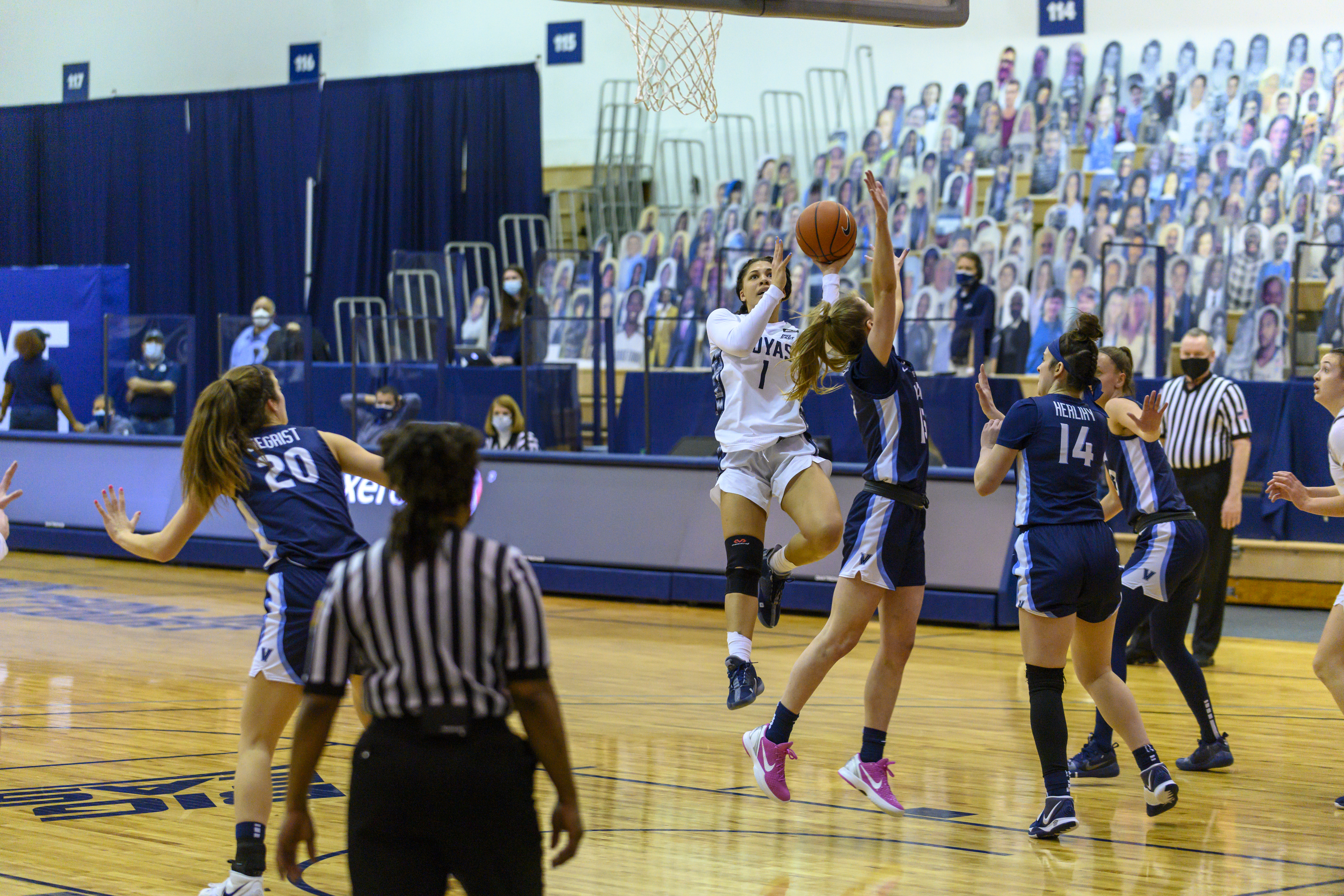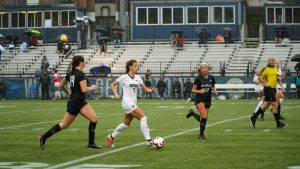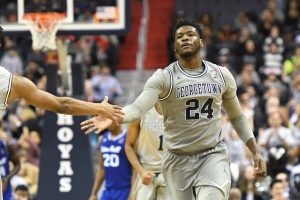On Jan. 30, Kelsey Ransom’s phone started blowing up as she walked into McDonough Arena for basketball practice. When she opened her phone, the standout sophomore guard saw a screenshot one of her teammates sent in their group chat of a Hoya sports Twitter fan page. The Tweet announced that the University would allow students to attend the men’s basketball game against St. John’s at McDonough on Feb. 3.
The Hoyas’ men’s basketball team has been playing all of their games in Capital One Arena in front of thousands of fans all season, including at the beginning of this spring semester when all on-campus, in-person events were moved to a virtual environment, postponed, or canceled.
For the Hoyas’ women’s basketball team, this meant that their home games were played without fans throughout the month of January, a month where the team was scheduled to play a barrage of five home games in a row. This, of course, only added to the frustration of COVID-19 cancellations at the beginning of the month, which included a home game at Entertainment and Sports Arena, home of the WNBA’s Washington Mystics, against perennial powerhouse UCONN.
Although Capital One follows DC public health policies rather than those that are university instituted, Georgetown Athletics encouraged student attendance at men’s basketball games, sponsoring buses to take students to Capital One and sending weekly emails reminding students of the game.
Ransom and her teammates were initially angry and confused when they saw the Tweet. Why had the University changed the policy for the men’s game and not for the women’s upcoming Feb. 9 game against Seton Hall? More importantly, why did the women have to find out over Twitter that the men would have fans instead of from Georgetown and the athletics department?
“Initially, we were more so confused because nobody had told us we would be allowed to have fans at our games, no one communicated to us that the men were gonna have fans at their game so it felt like we were kind of blindsided by the men coming in and playing their one game in McDonough having fans and nobody relayed any information to us,” Ransom said.
The original Jan. 30 email from Georgetown Athletics that was sent to student season ticket holders did include a parenthetical line concerning the women’s game. Because it was just one sentence in an email with the subject line addressing just the men’s basketball team, “Important Information: Hoyas v. St. John’s in McDonough Arena,” the announcement that fans would be able to attend the women’s games was largely overlooked. “That’s kind of what made us even more upset is that it was portrayed as the men’s big return to McDonough as if McDonough had been dusty this whole time, like no one’s been playing in it, but we have been. And women’s volleyball plays in it too,” Ransom said.
Ransom describes the email’s lack of emphasis on the women’s game as “kind of like the tip of the iceberg” in her frustration with athletics, leading her and teammate Graceann Bennett to utilize their Instagram accounts to voice their dissatisfaction. “People started getting angry because we’ve been playing in McDonough for years, and why were we bypassed in receiving the information when we play in there more than they do?” Ransom questioned.
Georgetown Athletics has largely answered Ransom’s question, as a member of athletics close to the women’s basketball team acknowledged that the administration and athletics should have explained the situation to the women, rather than have them find out the men would have fans through social media. Further, the women should have been told that they too would be allowed to have fans, as that message was seemingly lost in translation.
With the issue concerning fans in McDonough largely resolved, the bigger issue that it has exposed is the inequality between women’s and men’s sports on the Hilltop. As a female athlete, Ransom knows that the discrepancy is not something unique to Georgetown, but is in fact a larger issue within single-sex sports.
Even before Georgetown’s public health protocols were introduced, the women’s basketball team had a significantly smaller fan turnout at their games compared to the men’s basketball team, despite the fact that their games are played on campus and free to attend. Ransom attributes the smaller turnout to the Athletic Department’s emails, which are sent before every men’s basketball game to remind students to attend and sometimes even mention t-shirt giveaways or offer a few extra tickets to a game, free of charge. The remaining women’s basketball games played at McDonough this season will also feature t-shirt giveaways and raffles, though these perks have been promoted less intensely by Athletics.
Coming back to campus in January, it became harder for Ransom to see the support for the men’s team knowing that her team would be playing for an empty arena. “I saw the fan buses [for the men’s game] as I was walking into practice, and it’s kind of a slap in the face,” Ransom said. “Like we’re walking into practice to do the same amount of work they’re doing, to play with no fans when seven or eight charter buses are sending students to go see them play off-campus.”
Student-run clubs like Hoya Blue, the official student section for Hoya sports, try their best to attend every sporting event on campus. The football team often comes to support women’s basketball, too. These fan efforts are appreciated and do not go unnoticed by Ransom or her teammates, although she would like the support to be diversified and expanded. “It’s the people who come and they sit close to the door close to the exit because they come in just to see what the noise is down the hall, and then [they] see, it’s women’s basketball and they just sit for probably two minutes and they leave,” Ransom remarked.
“Or people that walk into McDonough may just like look down and think ‘it’s just women playing basketball’ and then they go and it’s something that you know, I’ve endured my entire life playing a sport and being a woman, but it’s something that I’ve chosen now recently to be less tolerant of.”
Ransom hopes to use her voice and her platform on social media to inspire change among the University to promote women’s games of every sport and increase student attendance. “I’m trying to hold myself accountable to not letting it kind of die down, because this is something society just does a lot when an event happens. There’s outrage and then time passes and we forget that it happens and there’s no emphasis on trying to correct the behavior, but I’ve kind of really pushed myself to stick with this and advocate for my team,” Ransom added. “It’s for my freshmen now, you know, it’s bigger than me, it’s bigger than them and basketball, it’s for all women’s sports and every single school across the country in America, I mean, that’s the reality of it.”
Rachel Cherelstein, the President of Hoya Blue, agrees with Ransom. As a direct liaison between students and athletics, Cherelstein acknowledges that her club is in a “unique position” that offers its members the ability to “have more voice when it comes to speaking with athletics and making sure that students are heard.” With that voice, Cherelstein hopes that Hoya Blue can motivate the University to promote women’s games just as much as the men’s. “I think as a whole, it’s our job to kind of hold athletics accountable, and I think this has been a great wake-up call for athletics,” Cherelstein said.
On Feb. 9 at 7:00 p.m., the women will host Seton Hall at McDonough, their first home game with student fans of the New Year. Ransom and the Hoyas want to put on a show.
“I think coming on Wednesday, it’s one of those pride things. It’s our first home game, we made a big fuss this week, we want to come out and do damage,” Ransom said. “I think our coaching staff and our entire team is on the same page. We’re coming out there with a purpose because we are very capable and we are capable of winning… and we don’t want to keep being the team that almost had it, a team that went to overtime and was almost there. We’re almost over the hump, we want to be over the hump and we think that Wednesday’s game, along with the support that we’re going to get, it makes us very capable of getting the win.”
As a student body, let’s do our part. The outrage on social media should only be the beginning of our support, so let’s not stop there. Let’s be the difference in McDonough Arena and help push the women’s basketball team to success, starting with their tough matchup tonight against Seton Hall. But, let’s also not stop there. As students, we need to continue to show up for the women’s basketball team, and all other women’s sports, such as softball and lacrosse. They need our support just as much as the men’s teams do, so let’s go Hoyas!





